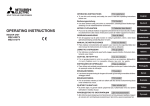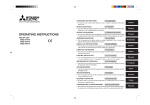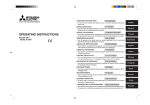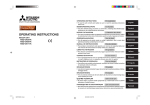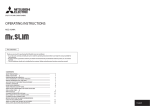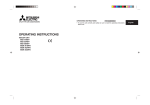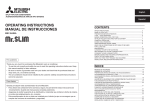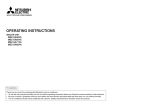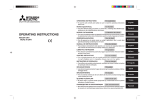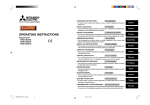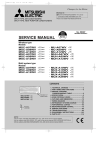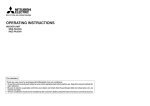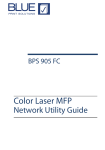Download Mitsubishi MUZ-A12YVH Operating instructions
Transcript
SPLIT-TYPE AIR CONDITIONERS OPERATING INSTRUCTIONS INDOOR UNIT MSZ-A09YV MSZ-A12YV OPERATING INSTRUCTIONS For customers To use this unit correctly and safely, be sure to read this operating instructions before use. English CONTENTS SAFETY PRECAUTIONS ........................................................................................................................................................ 2 NAME OF EACH PART ............................................................................................................................................................ 3 PREPARATION BEFORE OPERATION .................................................................................................................................. 4 I FEEL... AUTO OPERATION ................................................................................................................................................... 6 AUTO CHANGEOVER... AUTO MODE OPERATION .............................................................................................................. 7 MANUAL OPERATION (COOL, DRY, HEAT) ........................................................................................................................... 7 AIR FLOW VELOCITY AND DIRECTION ADJUSTMENT ...................................................................................................... 8 ECONO COOL OPERATION ................................................................................................................................................... 8 TIMER OPERATION (ON/OFF TIMER) ................................................................................................................................... 8 WHEN THE AIR CONDITIONER IS NOT GOING TO BE USED FOR A LONG TIME ............................................................ 9 MAINTENANCE ....................................................................................................................................................................... 9 CLEANING THE FRONT PANEL, HEAT EXCHANGER AND FAN ......................................................................................... 9 CLEANING THE CATECHIN AIR FILTER .............................................................................................................................. 10 REPLACEMENT OF THE AIR CLEANING FILTER ............................................................................................................... 10 CLEANING THE AIR OUTLET AND FAN OF THE INDOOR UNIT ....................................................................................... 11 BEFORE CONTACTING THE SERVICE REPRESENTATIVE, CHECK THE FOLLOWING AGAIN ...................................... 12 WHEN YOU THINK THAT TROUBLE HAS OCCURRED ...................................................................................................... 12 INSTALLATION, RELOCATION AND INSPECTION .............................................................................................................. 13 SPECIFICATIONS ................................................................................................................................................................. 13 SAFETY PRECAUTIONS • Since rotating parts and parts which could cause an electric shock are used in this product, be sure to read these “Safety Precautions” before use. • Since the cautionary items shown here are important for safety, be sure to observe them. Marks and their meanings WARNING: CAUTION: Incorrect handling could cause a serious hazard, such as death, serious injury, etc. with a high probability. Incorrect handling could cause a serious hazard depending on the conditions. Meanings of symbols used in this manual • The colour of the sticker affixed to the unit is written in the parentheses. : Be sure to follow the instruction. (Black) : Never insert your finger or stick, etc. (Black) : Never step onto the indoor/outdoor unit and do not put anything on them. (Yellow) : Danger of electric shock. Be careful. : Be sure to disconnect the power supply plug from the power outlet. (Blue) : Be sure to shut off the power. • After reading this manual, keep it together with the installation manual in a handy place for easy reference. Warning mark positions ENCLOSURE FRONT PANEL AIR OUTLET ENCLOSURE 2 This air conditioner is NOT intended for use by children or infirm persons without supervisions. WARNING Do not use intermediate connection of the power supply cord or the extension cord and do not connect many devices to one AC outlet. • A fire or an electric shock may result from poor contact, poor insulation, exceeding the permissible current, etc. Do not scratch or process the power supply cord, etc. • Do not put heavy object on the power supply cord and do not scratch or process the cord. The cord may be damaged and this may cause a fire or an electric shock. Do not turn the breaker off/on or disconnect/connect the power supply plug during operation. • This may cause a fire due to spark, etc. • Be sure to turn off the breaker or disconnect the power supply plug absolutely after switching the indoor unit off with the remote controller. Do not expose your skin directly to cool air for a long time. • This could damage your health. The customer should not install this unit. • If this is done incorrectly, it may cause a fire, an electric shock, or injury from the unit falling, water leaking, etc. Consult your dealer. Do not insert your finger or a stick, etc. into the air inlet/outlet. • Since the fan rotates at high speed, this may cause an injury. • Young children should be supervised to ensure that they do not play with the air conditioner. When an abnormality (burning smell, etc.) occurs, stop the air conditioner and disconnect the power supply plug or turn off the breaker. • If the unit continues to be operated in an abnormal condition, it may cause a fire, trouble, etc. In this case, consult your dealer. Repairs or relocation should not be done by the customer. • If this is done incorrectly, it may cause a fire, an electric shock, or injury from the unit falling, water leaking, etc. Consult your dealer. • If the power supply cord is damaged, it must be replaced by the manufacturer or its service agent in order to avoid a hazard. CAUTION : Be sure not to do. (Blue) • When the air filter is to be removed, do not touch the metal parts of the indoor unit. • This may cause an injury. Do not use an insecticide or flammable spray. • This may cause a fire or deformation of the cabinet. Do not put a pet or houseplant where it will be exposed to direct airflow. • This could injure the pet or plant. Do not leave the unit on an installation stand which is damaged. • The unit may fall and this may cause an injury. Do not step onto an unstable bench when maintaining the unit, etc. • This may cause an injury, etc. if you fall down. Do not pull the power supply cord. • The core wire of the power supply cord may be disconnected and this may cause a fire. Do not charge or disassemble the batteries and do not throw them into a fire. • This may result in leakage, fire or an explosion. Do not operate the unit for a long time in high humidity, e.g. leaving a door or window open. • In the cooling mode, if the unit is operated in a room with high humidity (80% RH or more) for a long time, water condensed in the air conditioner may drop and wet or damage furniture, etc. Do not operate the unit at low outside temperature (less than -10°C) in the cooling mode. • In the cooling mode, if the unit is operated at low outside temperature (less than -10°C), water condensed in the air conditioner may drop and wet or damage furniture, etc. SAFETY PRECAUTIONS CAUTION Do not use the unit for special purposes. • Do not use this air conditioner to preserve precision devices, food, animals, plants and art objects. This may cause deterioration of quality, etc. Do not put a stove, etc. where they are exposed to direct airflow. • This may cause imperfect combustion. When the unit is to be cleaned, switch it off and disconnect the power supply plug or turn off the breaker. • Since the fan rotates at high speed during operation, this may cause an injury. When the unit is not going to be used for a long time, disconnect the power supply plug or turn off the breaker. • Otherwise, dirt may collect and this may cause a fire. Replace the 2 batteries with new ones of same type. • Using an old battery together with a new one may result in heat generation, leakage or an explosion. If liquid from the batteries gets onto your skin or clothes, wash it well with clean water. • If liquid from the batteries gets into your eyes, wash them well with clean water and consult a doctor at once. Ventilate well in using the unit with a stove, etc. • An oxygen shortage may occur. Do not operate switches with wet hands. • This may cause an electric shock. Do not clean the air conditioner with water. • Water may enter the unit and degrade the insulation. This may cause an electric shock. Do not step or put anything on the indoor/outdoor unit. • This may cause an injury, etc. if you or something falls down. NAME OF EACH PART Indoor unit Front panel Air cleaning filter (White bellows type) Air inlet Heat exchanger to Breaker Catechin air filter (With deodorizer) Power supply cord Fan guard Remote control receiving section Air outlet Vertical vane Fan Horizontal vane Operation section Remote controller Display section (When the front panel is opened) For installation WARNING Emergency operation switch Operation Indicator lamp Remote control receiving section • Consult your dealer for installation of the air conditioner. CAUTION Do not install the unit where flammable gas could leak. • If gas leaks and collects around the unit, it may cause an explosion. Earth the unit. • Do not connect the earth to a gas pipe, water pipe, lightning rod or the earth of a telephone. If the earthing is incorrect, it may cause an electric shock. Install an earth leakage breaker depending on the place where the air conditioner is to be installed (humid places, etc.). • If the earth leakage breaker is not installed, it may cause an electric shock. Drain should be fully drained. • If the drainage route is incomplete, water may drop from the unit. This may wet and damage the furniture. Outdoor unit Air inlet (back and side) Piping Drainage hose Air outlet Drain outlet 3 NAME OF EACH PART PREPARATION BEFORE OPERATION Remote controller Auto restart function ■ Signal transmitting section Auto restart function is ... When the indoor unit is controlled with the remote controller, the operation mode, the set temperature and the fan speed are stored in the memory. If a power failure occurs or the main power is turned off during operation, “Auto restart function” sets automatically to start operating in the same mode as the one set with the remote controller just before the shutoff of the main power. (Refer to page 6 for details.) ˚C Operation display section CLOCK AMPM AMPM ON/OFF (operate/ stop) button TOO ON/OFF WARM These models are equipped with an auto restart function. If you do not want to use this function, please consult the service representative because the setting of the unit needs to be changed. TOO COOL Indoor unit Temperature buttons ■ Insert the power supply plug into the power outlet and/or turn the breaker on. WARNING: Remove dirt from the power supply plug and insert the plug securely. If dirt adheres to the plug or insertion is incomplete, it may cause a fire or an electric shock. Open the front lid. (This diagram shows an overall view.) AMPM TOO ON/OFF WARM Fan speed control button TOO COOL FAN STOP VANE START I FEEL HEAT DRY Off-timer button AUTO On-timer button COOL MODE HR. ECONO COOL MIN. Operation select button ECONO COOL button HR.button MIN.button (Time set buttons) RESET CLOCK RESET button CLOCK set button Vane control button 4 PREPARATION BEFORE OPERATION Remote controller How to set the batteries and the current time 1 Remove the front lid and insert batteries. Then reattach the front lid. Insert the minus pole of the batteries first. Check if the polarity of the batteries is correct. Insert the minus pole of the batteries first. 2 Press the RESET button. Handling of the remote controller • The range that the signal can reach is about 6 m when the remote controller is pointed at the front of the indoor unit. • When a button is pressed, one or two beeps will be heard from the indoor unit. If no sound is heard, operate again. • Use the remote controller carefully. If it is dropped, thrown or it gets wet, the remote controller may not operate. When installing on a wall, etc. • Install the remote controller holder in a position where the signal reception sound (beep) can be heard from the indoor unit when the ON/OFF button is pressed. When the remote controller cannot be used (emergency operation) When the batteries of the remote controller run out or the remote controller malfunctions, the emergency operation can be done using the EMERGENCY OPERATION switch. 1 Press the EMERGENCY OPERATION switch. • Each time the EMERGENCY OPERATION switch is pressed, the unit will operate in order of EMERGENCY COOL MODE, EMERGENCY HEAT MODE and STOP MODE. However, when the EMERGENCY OPERATION switch is once pressed, the unit will operate in test run for 30 minutes and then the operation mode shifts to EMERGENCY MODE. 2 To stop the emergency operation, press the EMERGENCY OPERATION switch once (in case of EMERGENCY HEAT MODE) or twice (in case of EMERGENCY COOL MODE). How to install/remove the remote controller Installing :Insert the remote controller downward. Removing :Pull it up. Press using a thin stick. Remote controller holder • If the RESET button is not pressed, the remote controller may not operate correctly. 3 Press the CLOCK set button. Press using a thin stick. 4 HR. MIN. Press the and buttons (TIME SET buttons) to set the current time. FAN STOP VANE START I FEEL HEAT DRY AUTO COOL MODE HR. ECONO COOL MIN. RESET CLOCK HR. • Each time the button is pressed, the set time MIN. increases by 1 hour, and each time the button is pressed, the set time increases by 1 minute. 5 Press the CLOCK set button again and close the front lid. Dry-cell batteries ■ Reference for replacing batteries Replace the batteries with new AAA alkaline batteries in the following cases: · When the indoor unit does not respond to the remote control signal. · When the display on the remote controller becomes dim. · When a button of the remote controller is pressed, all displays appear on the screen, and then disappear immediately. Do not use manganese batteries. The remote controller could malfunction. • The service life of an alkaline battery is about 1 year. However, a battery whose time limit is approaching may be exhausted soon. The recommended usable time limit is indicated (month/year) on the bottom of the battery. • To prevent liquid leakage, take out all batteries when the remote controller is not going to be used for a long time. CAUTION: If liquid from the batteries gets onto your skin or clothes, wash it well with clean water. If liquid from the batteries gets into your eyes, wash them well with clean water and consult a doctor at once. • Do not use rechargeable batteries. • Replace the 2 batteries with new ones of the same type. • Dispose of exhausted batteries in the correct manner. • Details of EMERGENCY MODE are as shown below. However, the temperature control does not work for 30 minutes in test run and the unit is set to continuous operation. The fan speed is set to High in test run and shifts to Medium after 30 minutes. Operation mode COOL Set temperature 24°C 24°C Medium Medium Auto Auto Fan speed Horizontal vane HEAT • The operation mode is indicated by the Operation Indicator lamp on the indoor unit as following figure. Operation Indicator lamp EMERGENCY COOL Operation Indicator EMERGENCY HEAT Operation Indicator STOP Operation Indicator 5 I FEEL... AUTO OPERATION With the “ (I FEEL...)” auto operation mode, the optimum room condition can be set automatically with a one-touch operation. Description of “I FEEL...” mode Details of operation To start operation: ˚C ■ CLOCK AMPM TOO COOL FAN STOP button. When the “ (I FEEL...)” mode is selected, the air conditioner is automatically controlled at the optimum temperature. AMPM TOO ON/OFF WARM ON/OFF Press the Details of auto operation To stop operation: ■ ON/OFF Press the button. Room temperature when started ○ ○ ○ ○ ○ ○ ○ ○ ○ ○ ○ ○ ○ ○ ○ ○ ○ ○ ○ ○ ○ ○ ○ ○ ○ ○ ○ ○ ○ ○ ○ ○ ○ I FEEL HEAT AUTO VANE DRY START If you feel slightly warm: COOL MODE HR. ECONO COOL MIN. ■ button to lower the temperature. One press lowers the temperature by about 1°C. If you feel slightly cool: ■ Operation mode Target temperature (initial state) About 25°C or higher COOL About 24°C About 25°C to 23°C DRY — About 23°C or lower HEAT About 26°C TOO WARM Press the RESET CLOCK Press the TOO COOL button to raise the temperature. One press raises the temperature by about 1°C. When “ (I FEEL...)” is not selected, press the button until it is set. MODE FAN Each time the button is pressed, the operation mode is changed in sequence: (I FEEL...) → (AUTO) → (COOL) → (DRY) → (HEAT) NOTE: COOL: When the room temperature is 2°C higher than the set temperature, the set temperature may not be changed since the air conditioner is operating to reach the target (set) temperature. In this case, please wait until the room temperature drops to within 2°C of the set temperature and then change the set temperature. HEAT: When the room temperature is 2°C lower than the set temperature, the set temperature may not be changed since the air conditioner is operating to reach the target (set) temperature. In this case, please wait until the room temperature rises to within 2°C of the set temperature and then change the set temperature. STOP Details of display on the indoor unit I FEEL HEAT AUTO VANE START The operation indicator at the right side of the indoor unit indicates the operation state. MODE HR. Operation Indicator ECONO COOL MIN DRY COOL Description of “AUTO RESTART FUNCTION” • These units are equipped with an auto restart function. When the main power is turned on, the air conditioner will start operation automatically in the same mode as the one set with the remote controller before the shutoff of the main power. • If the unit was set to off with the remote controller before the shutoff of the main power, it will remain stopped even after the main power is turned on. • If the unit was in the emergency operation before the shutoff of the main power, it will start operation, when main power comes on, in the same mode as the one set with the remote controller before the emergency operation. • If the unit is operated in “I FEEL...” or “AUTO” mode before power failure, the operation mode (COOL, DRY or HEAT) is not stored in the memory. When the main power is turned on, the unit decides the operation mode by the initial room temperature at restart and starts operation again. 6 According to the room temperature when the operation starts, the operation mode is automatically set to COOL, DRY or HEAT. However, when operation is started again within 2 hours after it is stopped, the same operation mode before the operation is stopped is selected. The operation mode selected first is not changed even if the room temperature changes. If the operation mode does not match the room condition, select the appropriate operation mode by pressing the MODE button. Lighted Blinking Not lighted Operation indicator lamp Indication Operation state Difference between target temperature and room temperature This shows that the air conditioner is operating to reach the target temperature. Please wait until the target temperature is obtained. About 2°C or more This shows that the room temperature is approaching the target temperature. About 2°C or less (In case of outdoor unit MXZ series only) This shows a state of standby for operation. Please refer to Information for multi system air conditioner. (Page 7) — AUTO CHANGEOVER... AUTO MODE OPERATION MANUAL OPERATION (COOL, DRY, HEAT) An automatic cooling and heating changeover operation system ensures easy control and year-round air conditioning. Once the desired temperature is set, unit operation is switched automatically between cooling and heating according to the room temperature. In addition, fan control of the outdoor unit enables cooling operation at outside temperature as low as -10 °C. To select the COOL, DRY or HEAT mode: ˚C CLOCK AMPM Press the 2 Select the operation mode by pressing the ˚C CLOCK AMPM Press the 2 Select the TOO COOL (AUTO) mode by pressing the FAN STOP VANE START I FEEL DRY AUTO MODE button. HR. ECONO COOL MIN. button. STOP HEAT VANE START DRY ■ ON/OFF Press the button. After the operation mode is set once, the operation starts in the same mode as the one set previously from the next time by simply pressing the button. ON/OFF AUTO COOL HR. ECONO COOL MIN. ON/OFF Press the button. RESET CLOCK After the operation mode is set once, the operation starts in the same mode as the one set previously from the next time by simply pressing the button. ON/OFF COOL MODE FAN I FEEL MODE ■ MODE To stop operation: To stop operation: HEAT TOO COOL button. Each time this button is pressed, the operation mode is changed in sequence: (I FEEL...) → (AUTO) → (COOL) → (DRY) → (HEAT) The set temperature is also displayed on the remote controller. AMPM TOO ON/OFF WARM TOO ON/OFF WARM ON/OFF 1 button. Each time this button is pressed, the operation mode is changed in sequence: (I FEEL...) → (AUTO) → (COOL) → (DRY) → (HEAT) AMPM To select the AUTO mode: ON/OFF 1 ○ ○ ○ ○ ○ ○ ○ ○ ○ ○ ○ ○ ○ ○ ○ ○ ○ ○ ○ ○ ○ ○ ○ ○ ○ ○ ○ ○ ○ ○ ○ ○ ○ ○ ○ ○ ○ ○ ○ ○ ○ ○ ○ ○ ○ ○ ○ ○ ○ ■ When the set temperature is to be changed: TOO WARM • Press the button to lower the temperature. One press lowers the temperature by about 1°C. TOO COOL • Press the RESET CLOCK In COOL operation ○ ○ ○ ○ ○ ○ ○ ○ ○ ○ ○ ○ ○ ○ ○ ○ ○ ○ ○ ○ ○ ○ ○ ○ ○ ○ ○ ○ ○ ○ ○ ○ ○ ○ ○ ○ ○ ○ ○ ○ ○ ○ ○ ○ ○ ○ ○ ○ ○ ■ • When the outside temperature is low, the fan of the outdoor unit turns on and off frequently to maintain sufficient cooling capacity. When the set temperature is to be changed: TOO WARM • Press the button to lower the temperature. One press lowers the temperature by about 1°C. In DRY operation button to raise the temperature. One press raises the temperature by about 1°C. • The temperature control (temperature setting) cannot be done. • The room temperature is slightly lowered in this operation mode. TOO COOL • Press the Description of “AUTO CHANGEOVER” (1) Initial mode 1 When unit starts the operation with AUTO operation from off; • If the room temperature is higher than the set temperature, operation starts in COOL mode. • If the room temperature is equal to or lower than the set temperature, operation starts in HEAT mode. (2) Mode change 1 COOL mode changes to HEAT mode when 15 minutes have passed with the room temperature 2 degrees below the set temperature. 2 HEAT mode changes to COOL mode when 15 minutes have passed with the room temperature 2 degrees above the set temperature. NOTE: If two or more indoor units are operating in multi system, there might be a case that the indoor unit, which is operating in (AUTO), cannot change over to the other operating mode (COOL↔HEAT) and becomes a state of standby. Refer to the detailed information for multi system air conditioner explained on the right. Description of “AUTO RESTART FUNCTION” Refer to page 6. button to raise the temperature. One press raises the temperature by about 1°C. ■ The details of the display on the indoor unit are explained on page 6. NOTE: When the ambient temperature is too high, the room temperature may not reach the set temperature since the unit operates to cool the room under a high load. Information for multi system air conditioner (Outdoor unit: MXZ series) Multi system air conditioner (Outdoor unit: MXZ series) can connect two or more indoor units with one outdoor unit. According to the capacity, two or more units can operate simultaneously. • When you try to operate two or more indoor units with one outdoor unit simultaneously, one for the cooling and the other for heating, the operation mode of the indoor unit that operates earlier is selected. The other indoor units that will start the operation later cannot operate, indicating an operation state. (Refer to the table of Operation Indicator lamp on page 6.) In this case, please set all the indoor units to the same operation mode. • When indoor unit starts the operation while the defrosting of outdoor unit is being done, it takes a few minutes (max. 10 minutes) to blow out the warm air. • In the heating operation, the indoor unit that does not operate may get warm or the sound of refrigerant flowing may be heard. This is not a malfunction since the refrigerant continuously flows into the indoor unit that does not operate. Description of “AUTO RESTART FUNCTION” Refer to page 6. 7 AIR FLOW VELOCITY AND DIRECTION ADJUSTMENT ECONO COOL OPERATION AIR FLOW velocity and direction can be selected as required. Use this operation when you want to be comfortable in COOL mode even with energy saved. ■ To change the AIR FLOW velocity, press the FAN button. Perform the following operations while the unit is operating in the MANUAL COOL mode. Each time the button is pressed, the fan speed is changed in sequence: (Low) → (Med.) → (High) → (AUTO) ˚C • Use the (High) notch to cool/heat the room more. • If the operating sound of the air conditioner disturbs your sleep, use the (Low) notch. ˚C CLOCK AMPM AMPM TOO ON/OFF WARM TOO COOL FAN STOP VANE START CLOCK ■ AMPM AMPM TOO ON/OFF WARM To change the AIR FLOW blowing direction vertically, press the VANE button. DRY TOO COOL Press the ECONO COOL FAN STOP I FEEL HEAT AUTO VANE START ■ Press the ECONO COOL COOL HR. ECONO COOL MIN. VANE RESET CLOCK SWING OPERATION Use the swing operation for the air flow to reach all corners of the room. Recommended horizontal vane range Use the (AUTO) position usually. Use position (1) or (2) in the COOL or DRY mode and use positions (3) to (5) in the HEAT mode when adjusting to your requirements. COOL DRY DRY 1 2 3 HEAT 4 button again. ○ ○ ○ ○ ○ ○ ○ ○ ○ ○ ○ ○ ○ ○ ○ ○ ○ ○ ○ ○ ○ ○ ○ ○ ○ ○ ○ ○ ○ ○ ○ ○ ○ AUTO MODE button. When the (ECONO COOL) operation is selected in COOL mode, the air conditioner performs swing operation in various cycle according to the temperature of air conditioner. Also SET TEMPERATURE is automatically set 2°C higher than in COOL mode. To release the ECONO COOL operation: Each time the button is pressed, the angle of the horizontal vane is changed in sequence: (1) → (2) → (3) → (4) → (5) → (SWING) → (AUTO) I FEEL HEAT ■ COOL MODE HR. ECONO COOL MIN. RESET CLOCK • When the button is pressed or the operation mode is changed during the ECONO COOL operation, ECONO COOL operation is released. TOO COOL TOO WARM FAN • The button, the are available. or button and ON/OFF timer (explained below) What is “ECONO COOL”? Swing air flow (change of air flow) makes you feel cooler than constant air flow. So, even though the set temperature is automatically set 2°C higher, it is possible to perform cooling operation with keeping comfort. As a result, energy can be saved. 5 NOTE: • In the cooling operation, when the air conditioner is operated with setting the horizontal vane to (4) or (5) for 1 hour, the AIR FLOW direction is automatically set to horizontal to prevent condensed water from dropping. • Adjust the vertical AIR FLOW direction using the remote controller. If the horizontal vane is moved manually, it may cause trouble. • In the heating operation, if the air flow temperature is too low or when defrosting is being done, the horizontal vane position is set to (1). Auto air flow direction control operation VANE When the AUTO mode is selected with the button, the position of the horizontal vane is automatically set to correspond to the operation mode for effective operation. (1) HEAT • When the air flow temperature is too low, the air is blown out horizontally. • When the air flow temperature rises, the air is blown out downwards. (2) COOL, DRY The air is blown out horizontally. NOTE: • When the operation mode changes in “ (AUTO)” mode, the horizontal vane is automatically changed to the position in each mode. 8 ■ To change the horizontal direction of the air flow, move the vertical vane manually. TIMER OPERATION (ON/OFF TIMER) It is convenient to set the timer when you go to bed, when you get home, when you get up, etc. How to set the ON timer 1 Press the START How to set the OFF timer 1 button during operation. Each time the button is pressed, the ON timer mode alternates between ON and OFF. 2 Set the time of the timer using the MIN. buttons. HR. and 2 HR. ■ Press the START button. STOP button during operation. Each time the button is pressed, the OFF timer mode alternates between ON and OFF. Set the time of the timer using the MIN. buttons. HR. and HR. Each time the button is pressed, the set time inMIN. creases by 1 hour; each time the button is pressed, the set time increases by 10 minutes. To release the ON timer: Press the Each time the button is pressed, the set time inMIN. creases by 1 hour; each time the button is pressed, the set time increases by 10 minutes. To release the OFF timer: ■ Press the STOP button. Programming timer operation Adjust the vane before operation starts. Since the horizontal vane moves automatically, your fingers may be caught. The ON timer and the OFF timer can be used in combination. The timer of the set time that is reached first will operate first. (“ ” mark indicates the order of timer operations.) • If the current time has not been set, the timer operation cannot be used. NOTE: If the main power is turned off or a power failure occurs while AUTO START/STOP timer is active, the timer setting is cancelled. As these models are equipped with an auto restart function, the air conditioner starts operating with timer cancelled at the same time that power is restored. WHEN THE AIR CONDITIONER IS NOT GOING TO BE USED FOR A LONG TIME When it is not going to be used for a long time: 1 Perform the FAN operation for 3 or 4 hours to dry the inside of the air conditioner. • To perform FAN operation, set the remote controller to the highest temperature in the MANUAL COOL mode. (Refer to page 7.) 2 When the air conditioner is to be used again: 1 2 3 3 Remove the batteries from the remote controller. Front panel 1 1 Pull 3 Insert Hinge Check that the air inlet and outlet of the indoor/outdoor units are not blocked with any obstacles. Heat exchanger Hole Check that the earth is connected correctly. CAUTION: Earth the unit. Do not connect the earth to a gas pipe, water pipe, lightning rod or the earth of a telephone. If the earthing is incorrect, it may cause an electric shock. CAUTION: • Do not drop the front panel or pull it out forcibly. The panel may be damaged. • Do not step onto an unstable bench when removing or installing the front panel. This may cause an injury, etc. if you fall down. 2 MAINTENANCE ■ Turn off the breaker and/or disconnect the power supply plug. CAUTION: When the unit is to be cleaned, switch it off and disconnect the power supply plug or turn off the breaker. Since the fan rotates at high speed during operation, it may cause an injury. Hold both ends of the front panel, lift the panel up until its level, and then pull it towards you. Clean the air filter and install it in the indoor unit. CAUTION: To prevent liquid leakage, take out all batteries when the remote controller is not going to be used for a long time. Before starting maintenance Heat exchanger (Refer to page 10 for cleaning instructions.) Turn off the breaker and/or disconnect the power supply plug. CAUTION: Turn off the breaker or disconnect the power supply plug when the air conditioner is not going to be used for a long time. Dirt may collect and this may cause a fire. CLEANING THE FRONT PANEL, HEAT EXCHANGER AND FAN • If the dirt is noticeable, wipe the front panel with a cloth soaked in a solution of mild detergent diluted in lukewarm water. • Do not use gasoline, benzine, thinner, polishing powder, or insecticide and do not wash the front panel with a scrubbing brush or the hard surface of a sponge. • Do not soak the front panel in water/lukewarm water longer than two hours and do not expose the panel to direct sunlight, heat, or flames when drying it. The panel may be deformed or discolored. Cleaning the indoor unit ■ Clean the unit using a soft dry cloth. • If the dirt is noticeable, wipe the unit with a cloth soaked in a solution of mild detergent diluted in lukewarm water. • Do not use gasoline, benzine, polishing powder, or insecticide. The unit may be damaged. • The front panel may come off if it is lifted up past its level position. If the front panel comes off, refer to step 3 in CLEANING THE FRONT PANEL explained on the right. Wipe the front panel with a soft dry cloth or wash it with water. After washing the panel, wipe up the remaining water with a soft dry cloth and let it dry out of direct sunlight. 3 Hold both ends of the front panel, keep the panel level, and insert the hinges into the holes on the upper part of the indoor unit until they click into place. (1) Then, close the front panel securely. (2) You can sweep the surface of heat exchanger if you install the special-made brush to your vacuum cleaner. Please refer to the instructions described in Quick Clean Kit for details. WARNING: • Do not touch the heat exchanger directly with your hands. Otherwise you may get injured. (It’s recommended to protect your hands with a pair of gloves.) CAUTION: • Do not step onto an unstable bench when cleaning. Otherwise you may fall down and get injured. • Use only the special-made brush listed below. Do not use other stuffs. Otherwise the heat exchanger of the indoor unit may get damaged. Optional product Name of parts Quick Clean Kit Parts number MAC-093SS-E Optional product is available from your local dealer. NOTE: Only available for the hose diameter of vacuum cleaner : 32 - 39 mm (inside diameter). Fan Refer to page 11 for cleaning the fan. 1 Keep the panel level and insert the hinges into the holes. 2 9 CLEANING THE CATECHIN AIR FILTER Cleaning the catechin air filter (about once every 2 weeks) 1 3 Remove the catechin air filter. Open the front panel, then remove/replace the filter. Catechin air filter After washing with water/lukewarm water, dry the catechin air filter well in the shade. • Do not expose the catechin air filter to direct sunlight or heat from a fire when drying it. REPLACEMENT OF THE AIR CLEANING FILTER When the capacity is lowered because of dirt, etc., it is necessary to replace the air cleaning filter. Air cleaning filter replacement (about once every 4 months) 1 Remove the catechin air filter. Install a new air cleaning filter. Remove. 4 Catechin air filter CAUTION: When the catechin air filter is to be removed, do not touch the metal parts of the indoor unit. This may cause an injury. 2 3 2 4 Install the catechin air filter and securely close the front panel. Remove the air cleaning filter (White bellows type). Install the catechin air filter. Remove dirt from the catechin air filter using a vacuum cleaner or by washing the filter with water. • If the dirt is noticeable, wash the filter with a solution of mild detergent diluted in lukewarm water. • If hot water (50 °C or more) is used, the filter may be deformed. Air cleaning filter Install. ○ ○ ○ ○ ○ ○ ○ ○ ○ ○ ○ ○ ○ ○ ○ ○ ○ ○ ○ ○ ○ ○ ○ ○ ○ ○ ○ ○ ○ ○ ○ ○ ○ ○ ○ ○ ○ ○ ○ ○ ○ ○ ○ ○ ○ ○ ○ ○ ○ Air cleaning filter • If the air cleaning filter is clogged, it may lower the unit’s capacity or cause condensation at the air outlet. • The air cleaning filter is disposable. The standard usable term is about 4 months. However, if the colour of the filter turns to dark brown, replace the filter at once. Optional parts Optional parts are available from your local dealer. ○ ○ ○ ○ ○ ○ ○ ○ ○ ○ ○ ○ ○ ○ ○ ○ ○ ○ ○ ○ ○ ○ ○ ○ ○ ○ ○ ○ ○ ○ ○ ○ ○ ○ ○ ○ ○ ○ ○ ○ ○ ○ ○ ○ ○ ○ ○ ○ ○ What is “Catechin air filter”? The air filter is dyed with a natural material, catechin, that is contained in tea. The catechin air filter deodorizes odor and noxious gases such as formaldehyde, ammonia, and acetaldehyde. Moreover, it restraints the activity of the viruses adhering to the filter. 10 Name of parts AIR CLEANING FILTER Parts number MAC-1300FT CLEANING THE AIR OUTLET AND FAN OF THE INDOOR UNIT 4 Before cleaning Clean the air outlet and fan of the indoor unit. (Make sure the fan has stopped.) Switch the indoor unit off with the remote controller and disconnect the power supply plug and/or turn off the breaker, otherwise you may get injured since the fan of the indoor unit rotates at high speed during operation. 1 • Be careful not to injure your hands. • If the air outlet or fan is dirty, moldy, or dusty, clean with a wet or dry soft cloth or with a special-made brush which is installed to a vacuum cleaner. If the dirt is noticeable around the air outlet, clean with a cloth soaked in a solution of mild detergent diluted in lukewarm water. Manually tilt the horizontal vanes downward, and make sure the fan has stopped. 5 Put the vertical vanes back to their original positions one by one. 1 Hold the green tab of each vertical vane and insert 2 Push each vertical vane until it clicks into place. the vertical vanes into their respective grooves. Downward. 2 Remove the horizontal vanes. Be sure to hold each horizontal vane when unlocking the stoppers. Upper vane Follow procedures 1 to 3 to remove the upper vane. Fan guard Groove 1 Stopper 2 Stopper • Be sure to hold the green tabs to install the vertical vanes, otherwise the vanes can be damaged. • Do not use excessive force to the fan guard during this procedure. The fan guard may be deformed and the vanes may not work properly. • Put the vertical vanes back correctly to their original positions. Otherwise, condensed water may drip down from the indoor unit or the horizontal vanes could malfunction. 3 Pull out. Unlock. Lock. Out. Unlock. 6 Unlock. Install the horizontal vanes. (Reverse the removal procedures.) Upper vane Upper left Upper vane Lower vane Follow procedures 4 to 6 to remove the lower vane. Insert this end first. 5 6 Upper right 3 5 Lock. Lock. Lower left Stopper Stopper 4 Insert. 4 Unlock. 6 Lower vane Unlock. Unlock. Pull out. Out. Lower vane Swing the vertical vanes out one by one. 1 Grab the green tab of each vertical vane and pull it towards you to swing out each vertical vane. In. Lock. The holes on the insertion ends of the upper and lower horizontal vanes have different shapes. Insert this end first. 3 2 Hold the green tab of each vertical vane and move 2 1 the vertical vanes in the directions of the arrows. The vanes cannot be removed. Insert. Hold. Cannot be removed. Lower right Lock. Lock. In. In procedures 2 , 3 , 5 , and 6 , lock the stoppers until they click into place. After Cleaning Pull towards you. Fan guard Green tab Swing to the left. Swing to the right. • Be sure to hold the green tabs to swing out the vertical vanes, otherwise the vanes can be damaged. • Do not use excessive force to the fan guard during this procedure. The fan guard may be deformed and the vanes may not work properly. Refer to the illustration of the fan guard in NAME OF EACH PART on the page 3. Insert the power supply plug into the power outlet and/or turn on the breaker. Check that both of the operation indicator lamps are not blinking. If they are blinking, the horizontal vanes are not installed correctly. In this case, disconnect the power supply plug and/or turn off the breaker, and then reinstall the horizontal vanes by following the procedures in step 6. • If you operate the air conditioner after cleaning the air outlet and fan, do not get close to the air outlet as any remaining dirt may be discharged. 11 BEFORE CONTACTING THE SERVICE REPRESENTATIVE, CHECK THE FOLLOWING AGAIN Question Check points The air conditioner cannot • Is the breaker turned on? • Is the fuse blown? be operated. • Is the ON timer set? (Page 8) Both of the operation indi- • Is the horizontal vane attached to the indoor unit correctly? (Page 11) cator lamps on the indoor unit are blinking. The horizontal vane does • Are the horizontal vane and the vertical vane attached to the indoor unit correctly? (Page 11) not move. • Is the fan guard deformed? The room cannot be cooled • Is the temperature setting correct? (Page 7) • Is the filter clean? (Page 10) or heated sufficiently. • Is the fan of the indoor unit clean? (Page 11) • Are there any obstacles blocking the air inlet or outlet of the indoor or outdoor unit? • Is a window or door open? The air from the indoor unit • Is the filter clean? (Page 10) • Is the fan of the indoor unit clean? (Page 11) smells strange. The display on the remote • Are the batteries exhausted? (Page 5) controller does not appear • Is the polarity (+, -) of the batteries correct? (Page 5) or it is dim. The indoor unit does not respond to the re- • Are any buttons on the remote controller of other electric appliances being pressed? mote control signal. When a power failure oc- • Does the air conditioner start operating again? If the air conditioner had operated before the curs. power failure, as these models are equipped with an auto restart function, the air conditioner should start operating again. (Refer to Description of “AUTO RESTART FUNCTION” on page 6.) Even if the above items are checked, when the air conditioner does not recover from the trouble, stop using the air conditioner and consult your dealer. In the following cases, stop using the air conditioner and consult your dealer. • When water leaks or drops from the indoor unit. • When the left operation indicator lamp blinks. • When the breaker trips frequently. • The remote control signal may not be received in a room where an electronic ON/OFF type fluorescent lamp (inverter-type fluorescent lamp, etc.) is used. • Operation of the air conditioner may interfere with radio or TV reception in areas where the reception is weak. An amplifier may be required for the affected device. • When thunder is heard, stop operation and disconnect the power supply plug or turn off the breaker. Otherwise, the electrical parts may be damaged. 12 WHEN YOU THINK THAT TROUBLE HAS OCCURRED Question Answer (not a malfunction) The air conditioner cannot • This protects the air conditioner according to instructions from the microprocessor. Please wait. be operated for about 3 minutes when restarted. Cracking sound is heard. • This sound is generated by the expansion/contraction of the front panel, etc. due to change in temperature. The air from the indoor unit • The air conditioner may suck in an odor adhering to the wall, carpet, furniture, cloth, etc. and smells strange. blow it out with the air. The fan of the outdoor unit • When the outside temperature is low, the fan may not operate to maintain sufficient cooling does not rotate even though capacity. the compressor is running. Even if the fan starts to rotate, it stops soon. The sound of water flowing • This is the sound of refrigerant flowing inside the air conditioner. is heard. • This is the sound of condensed water flowing in the heat exchanger. • This is the sound of the heat exchanger defrosting. The sound as burbling is • This sound is heard when the outside air is absorbed from the drain hose in turning on the heard. range hood or the ventilation fan and that makes water flowing in the drain hose spout out. This sound is also heard when the outside air blows into the drain hose in case the outside wind is strong. The room cannot be cooled • When a ventilation fan or a gas cooker is used in a room, the cooling load increases, resulting sufficiently. in an insufficient cooling effect. • When the outside air temperature is high, the cooling effect may not be sufficient. Mist is discharged from the • The cool air from the air conditioner rapidly cools moisture in the air inside the room, and it turns air outlet of the indoor unit. into mist. Mechanical sound is heard • This is the switching sound in turning on/off the fan or the compressor. from the indoor unit. Question Answer (not a malfunction) • When the air conditioner is operated in COOL The air flow direction or DRY mode, if the operation continues with air changes during operation. blowing down for 1 hour, the direction of the air The direction of the horiflow is automatically set to horizontal to prevent zontal vane cannot be adcondensed water from dropping. justed with the remote con• In the heating operation, if the air flow temperatroller. ture is too low or when defrosting is being done, the horizontal vane position is automatically set to horizontal. Water leaks from the out- • During COOL and DRY operations, pipe or pipe connecting sections are cooled and this causes door unit. water to condense. • In the heating operation, the defrosting operation makes water frozen on the outdoor unit melt and drip down. • In the heating operation, water condensed on the heat exchanger drips down. White smoke is discharged • In the heating operation, vapor generated by the defrosting operation looks like white smoke. from the outdoor unit. Air does not blow out soon • Please wait as the air conditioner is preparing to blow out warm air. in the heating operation. The operation is stopped • Defrosting of the outdoor unit is being done (Defrosting operation). for about 10 minutes in the Since this is completed in 10 minutes, please heating operation. wait. (When the external temperature is too low and humidity is too high, frost is formed.) Hissing sound is some- • This is the sound when the flow of refrigerant inside the air conditioner is switched. times heard. The room cannot be heated • When the outside air temperature is low, the heating effect may not be sufficient. sufficiently. In a multi-unit system, the • A small amount of refrigerant continues to flow into the indoor unit even though it is not operatindoor unit which is not oping. erating becomes warm and a sound, similar to water flowing, is heard from the unit. The air conditioner starts • These models are equipped with an auto restart function. When the main power is turned off withthe operation only with the out stopping the air conditioner with the remote main power turned on, controller and is turned on again, the air condithough you do not operate tioner will start operation automatically in the the unit with the remote same mode as the one set with the remote concontroller. troller just before the shutoff of the main power. INSTALLATION, RELOCATION AND INSPECTION Installation place Avoid installing the air conditioner in the following places. • Where flammable gas could leak. Inverter-type fluorescent lamp To prevent the effects of a fluorescent lamp, keep as far apart as possible. CAUTION: Do not install the unit where flammable gas could leak. If gas leaks and collects around the unit, it may cause an explosion. • Where there is much machine oil. • Salty places such as the seaside. • Where sulfide gas is generated such as a hot spring. • Where oil is splashed or where the area is filled with oily smoke. • Where there is high-frequency or wireless equipment. The installation location of the outdoor unit should be at least 3 m away from the antennas for TV sets, radios, etc. In areas where the reception is weak, provide greater space between the outdoor unit and the antenna of the affected device if operation of the air conditioner interferes with radio or TV reception. wall, etc. Keep a space to prevent the picture distortion or the noise. 1m or more Wellventilated dry place Cordless phone or Portable phone Radio Inspection and maintenance 100 mm or more 200 mm or more TV 1m or more CAUTION: • Earth the unit. Do not connect the earth to a gas pipe, water pipe, lightning rod or the earth of a telephone. If the earthing is incorrect, it may cause an electric shock. • Install an earth leakage breaker depending on the place where the air conditioner is to be installed (humid places, etc.). If the earth leakage breaker is not installed, it may cause an electric shock. 3m or more WARNING: If the air conditioner operates but does not cool or heat (depending on model) the room, consult your dealer since there may be a refrigerant leak. Be sure to ask the service representative whether there is refrigerant leakage or not when repairs are carried out. The refrigerant charged in the air conditioner is safe. Refrigerant normally does not leak, however, if refrigerant gas leaks indoors, and comes into contact with the fire of a fan heater, space heater, stove, etc., harmful substances will be generated. • When the air conditioner is used for several seasons, the capacity may be lowered due to dirt inside the unit. • Depending on the condition, an odor may be generated or dehumidified water may not drain out smoothly due to dirt, dust, etc. • It is recommended that the unit be inspected and maintained (charged) by specialist in addition to normal maintenance. Consult your dealer. Operating sound considerations • Do not put an object around the air outlet of the outdoor unit. This may lower the capacity or increase the volume of the operating sound. • If an abnormal sound is heard during operation, consult your dealer. Relocation Electrical work • When the air conditioner is to be removed or re-installed because of rebuilding, moving, etc., special techniques and work are required. • Provide an exclusive circuit for the power supply of the air conditioner. • Be sure to observe the breaker capacity. WARNING : • The customer should not install this unit. If installation is done incorrectly, it may cause a fire, an electric shock, or injury from the unit falling, water leaking, etc. • Do not use intermediate connection of the power supply cord or the extension cord and do not connect many devices to one AC outlet. A fire or an electric shock may result from poor contact, poor insulation, exceeding the permissible current, etc. Consult your dealer. WARNING: Repairs or relocation should not be done by the customer. If this is done incorrectly, it may cause a fire, an electric shock, or an injury from the unit falling, water leaking, etc. Consult your dealer. Disposal To dispose of this product, consult your dealer. If you have any questions, consult your dealer. SPECIFICATIONS Model Set name Indoor Outdoor Function Power supply Capacity Input Indoor Outdoor Refrigerant filling capacity (R410A) Indoor IP code Outdoor Permissible LP ps excessive operating HP ps pressure Indoor Noise level (High/Med./Low) Outdoor Weight kW kW kg kg MSZ-A09YV(H) MSZ-A12YV(H) MSZ-A09YV MSZ-A12YV MUZ-A09YV(H) MUZ-A12YV(H) Cooling Heating Cooling Heating ~ /N, 230V, 50Hz 2.5 3.2 3.5 4.0 0.67 0.84 1.09 1.08 9 10 33 34 kg 0.80 NOTE: 1. Rating condition Cooling — Heating — Indoor: Outdoor: Indoor: Outdoor: 2. Guaranteed operating range 0.90 Indoor IP 20 IP 24 MPa 1.64 MPa 4.15 Upper limit Cooling Lower limit Upper limit dB(A) dB(A) 37/29/21 38/30/21 46 27°C DB, 19°C WB 35°C DB 20°C DB 7°C DB, 6°C WB 39/31/22 38/30/22 47 48 Heating Lower limit 32°C DB 23°C WB 21°C DB 15°C WB 27°C DB — 20°C DB — Outdoor MUZ-A09/A12YV MUZ-A09/A12YVH 46°C DB 46°C DB — — -10°C DB -10°C DB — — 24°C DB 24°C DB 18°C WB 18°C WB -10°C DB -15°C DB -11°C WB -16°C WB 13 This product is designed and intended for use in the residential, commercial and light-industrial environment. The product at hand is based on the following EU regulations: • Low Voltage Directive 73/23/ EEC • Electromagnetic Compatibility Directive 89/336/ EEC HEAD OFFICE: MITSUBISHI DENKI BLDG., 2-2-3, MARUNOUCHI, CHIYODA-KU, TOKYO 100-8310, JAPAN SG79Y280H01














